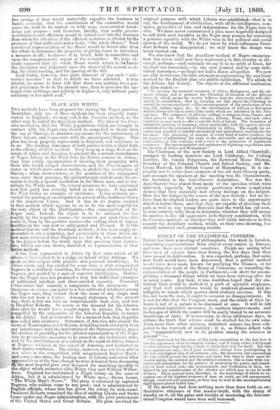RESULT OF THE STATISTICAL CONGRESS.
THERE has been a meeting of philosophers, this week in London, comprising representatives from almost every nation in Europe, and some from more distant countries. People are asking what these men of science have done during the five days that they have passed in deliberation. It was expected, perhaps, that some new truth would have been discovered, that a perfect method would have been made known for purifying the Thames, or for expediting the work of the House of Commons, or amending the representation of the people in Parliament,—in short for accom- plishing a thousand things which we have been striving after for so many years. Any how, it was doubtless hoped that dry sta- tistical facts would be clothed in a garb of splendid eloquence, and that dull calculations would be rendered pleasant and. in- telligible to minds which sported amid abstract sciences. H. this has not been the ease, it ought to occasion no disappointment- It is not for this that the Congress meet, and the result of their la- bours is not of a nature to be discussed at once. It will be felt in practical legislative measures, in sanitary improvements, and in changes of which the source will be easily traced to an accurate knowledge of facts. It is necessary, in these utilitarian days,. to enforce the truth that science must be studied for its own sake. Even more than other sciences, statistical science has been sub- jected to the reproach of inutility ; it is, as Prince Albert tells us, "comparatively new in its position among the sciences in general" :— " We must look for the cause of this tardy recognition to the fact that it has the appearance of an incomplete science, and of being rather a helpmate to other sciences than having a right to claim that title for itself: But this is an appearance only ; for if pure statistics abstain from participating in the last and highest aim of all sciences—viz., the discovery and expounding the laws which govern the universe, and leave this duty to their more fa- voured sisters, the natural and the political sciences, this is done with con- scious self-abnegation, for the purpose of protecting the purity and simpli- city of their sacred task—the accumulation and verification of facts, un- biassed by any consideration of the ulterior use which may or can be made of them. Those general laws, therefore, in the knowledge of which we re- cognize one of the highest treasures of man on earth, are left unexpressed, though rendered self-apparent, as they may be read in the uncompromising rigid figures placed before him." If the meeting had done nothing more than draw forth an. au- thoritative utterance of this coaster-truth, with the stamp of royalty on it, all the pains and trouble of mustering the Interna- tional Congress would have been well bestowed.


























 Previous page
Previous page